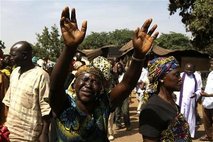 DOGO NAHAWA, Nigeria (Reuters) – Villagers in central Nigeria buried dozens of bodies, including those of women and children, in a mass grave on Monday after attacks in which several hundred people were feared to have been killed.
DOGO NAHAWA, Nigeria (Reuters) – Villagers in central Nigeria buried dozens of bodies, including those of women and children, in a mass grave on Monday after attacks in which several hundred people were feared to have been killed.Armed police and soldiers stood guard as residents of Dogo Nahawa, about 15 km (9 miles) south of the central city of Jos, carried bodies wrapped in multi-colored cloth from trucks and lowered them into a large open pit in the red-brown earth.
Residents of the small village and two other predominantly Christian settlements said Muslim herders from surrounding hills attacked in the early hours of Sunday, opening fire to force them out of their homes before slashing them with machetes.
Acting President Goodluck Jonathan called an emergency meeting with security service chiefs in the capital Abuja to try to prevent the violence in Nigeria's volatile "Middle Belt" from spreading to neighboring states.
"For many years people have been living together peacefully ... We don't know what happened," one Dogo Nahawa resident, Dan Yamu, told Reuters at the burial ceremony.
Witnesses said Sunday's attack appeared to be a reprisal for unrest around Jos -- the capital of Plateau state -- in January, when clashes between Christian and Muslim mobs killed several hundred people.
The latest violence in the center of Africa's most populous nation comes at a difficult time for Jonathan, who is trying to assert his authority while ailing President Umaru Yar'Adua remains too sick to govern.
U.S. Secretary of State Hillary Clinton called on all sides to show restraint and urged the government to "ensure that the perpetrators of acts of violence are brought to justice under the rule of law."
Plateau state lies at the crossroads of Nigeria's Muslim north and Christian south and fierce competition for control of fertile farmlands between indigenous groups and settlers from the north have repeatedly triggered unrest over the past decade.
The instability underscores the fragility of Africa's top energy producer as it approaches the campaign period for 2011 elections with uncertainty over who is in charge.
DEATH TOLL UNKNOWN
A Reuters witness counted more than 100 bodies on Sunday in Dogo Nahawa alone, but victims were also brought to hospitals in Jos and some were quickly buried, making it difficult for officials to assess the toll.
"Soldiers are patrolling and everywhere remains calm ... We are estimating 500 people killed but I think it should be a little bit above that," Plateau State Commissioner for Information Gregory Yenlong said.
Police spokesman Mohammed Lerama said the number of dead officially recorded so far stood at 55.
Death tolls have been highly politicized in previous outbreaks of unrest in central Nigeria, with various factions accused of either exaggerating the figures for political ends or downplaying them to try to douse the risk of reprisals.
A Red Cross spokesman said the security situation was "still in disarray" and that while its teams had been able to help evacuate some people to hospital in Jos, they were still trying to reach all those areas affected.
Yar'Adua returned from three months in a Saudi hospital, where he was being treated for a heart condition, almost two weeks ago but has still not been seen in public. Presidency sources say he remains in a mobile intensive care unit.
Jonathan put the security forces on red alert late on Sunday to try to prevent reprisal attacks spreading into neighboring states. He ordered the security forces to "confront and defeat these roving bands of killers."
Soldiers have been on the streets of Jos policing a dusk-to-dawn curfew since four days of clashes between Christian and Muslim mobs in January, when community leaders put the death toll at more than 400.
(Additional reporting by Arshad Mohammed in Washington; Writing by Nick Tattersall; Editing by Dominic Evans)



